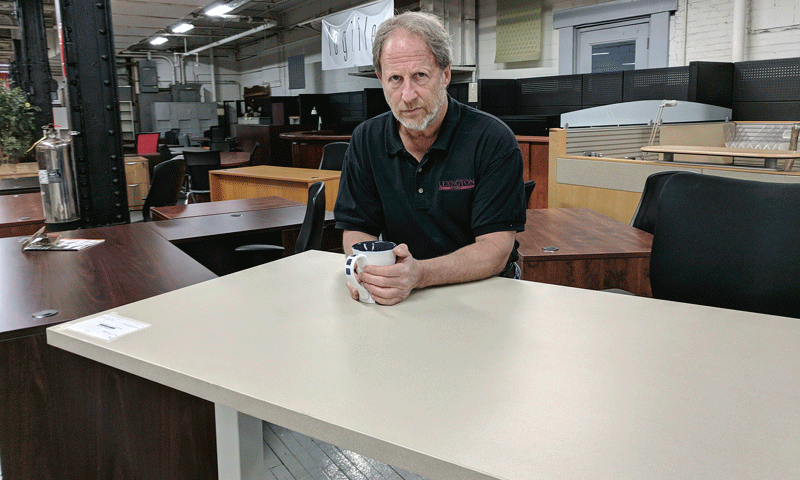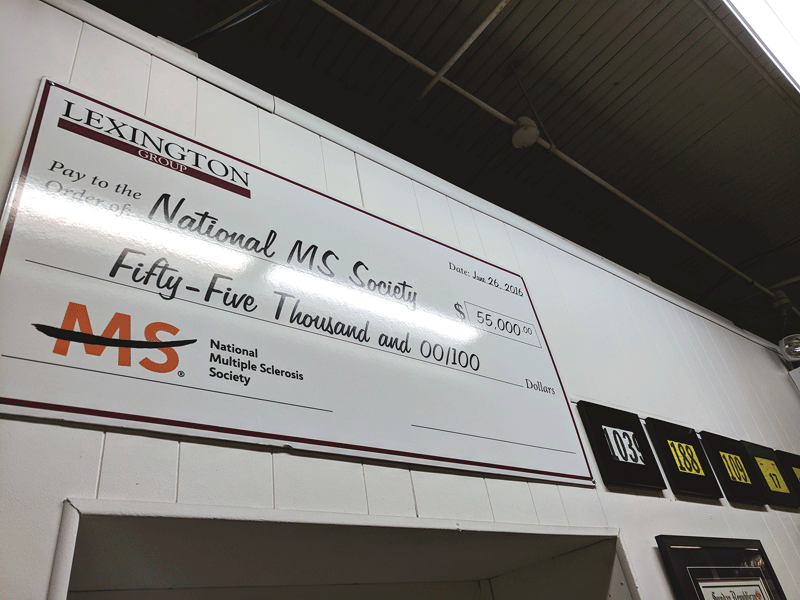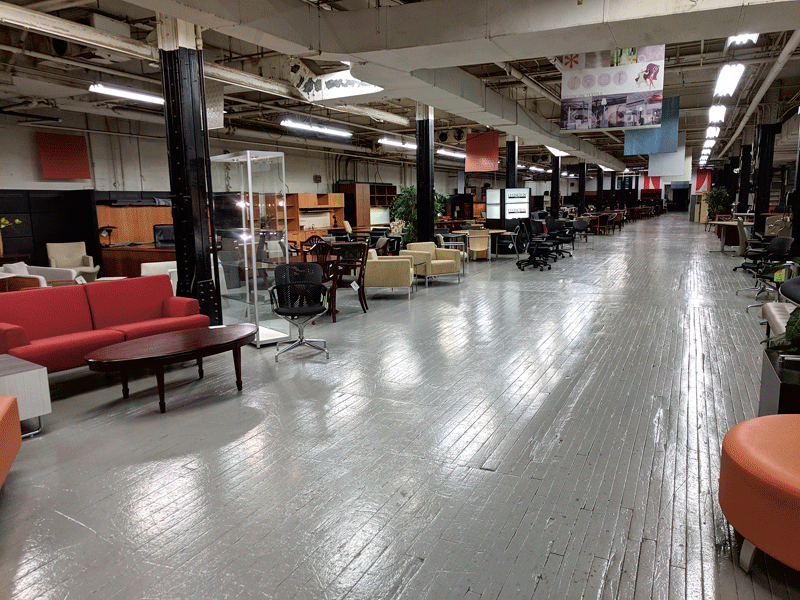At Lexington Group, Office Design Starts with Relationships
More Than a Desk

Mark Proshan at a sit-stand desk, one of hundreds of display pieces in Lexington Group’s 165,000-square-foot warehouse.
In the 28 years Mark Proshan has been in the furniture-sales and office-design business, he has seen plenty of change, from a greater emphasis on open, collaborative spaces to more challenging timetable demands from clients. Through it all, though, he continues to cultivate a business philosophy built on relationships and trust — even at a time when many clients are more interested in speed and cost.
Mark Proshan says he can count on one hand the number of contracts he’s drawn up over the years. He’d rather do business with a handshake.
“Relationships in this business are important,” he said. “The more you talk about it, the more cliché it sounds, but the notion that somebody can count on you when you promise to deliver something still means something, and our customers value the notion that we don’t promise things we can’t deliver.”
Proshan, owner of Lexington Group, which specializes in sales of new and refurbished office furniture as well as interior-design solutions, said he’s always been willing to lose money if it meant keeping a commitment he made to a customer.
“It’s fundamentally more important for that person to know I did everything conceivably possible to do what it was I said I would do. The lion’s share of new business comes from referrals from other people, and if that’s the way you market yourself, you’re only as good as the last job you did. If you don’t do what you said you’d do, your ability to gain a referral based on past work will dry up very quickly.”
These philosophies are important in many businesses, but they’re especially relevant to someone who launched his company 28 years ago and has seen so many other facets of the business — from the products customers are looking for to the timetables they expect — change so much.
“You need to adjust to what’s happening, to stay current,” Proshan said, and part of that is understanding clients’ shifting demands.
“We used to have people come in here with blueprints for a project six to nine months in advance, and they’d want to talk about their plans for a new space and everything that goes along with that, from carpeting to lighting to furniture and walls,” he told BusinessWest. “Now, we’re seeing younger people who show you a couple of pictures on their phone — ‘this is what I’m looking for’ — and if you can’t give it to them right away, they’re gone in the blink of an eye. It requires a whole different way of trying to figure out how to keep them engaged.”
Part of that is maintaining a deep inventory of new and pre-owned items on site in Lexington’s 165,000-square-foot showroom on Union Street in West Springfield. “That way, they can walk around and very quickly take a look and say, ‘yeah, that works; that doesn’t work.’ All the decisions are made very differently than in the past.”

A long-time supporter of the National Multiple Sclerosis Society, Mark Proshan’s team raised $55,000 this year in the Bike MS: Cape Cod Getaway fund-raising bike ride.
Proshan also has access to networks across the country, so a quick check of the Internet brings plenty more options for customers looking to change over an office, classroom, or retail space.
Lexington Group provides services from sales, installation, and delivery to space planning, office design, and reconfiguring work, and many of its 25-strong workforce have built up plenty of experience in the field. “We tend to mentor people into the business slowly, and once they’re here, they tend to stick around for the long haul. I’ve got a handful of people who have been here since the late ’80s and early ’90s.”
For this issue’s focus on the modern office, Proshan explains how that idea — and the means by which companies hope to achieve it — have evolved.
Wide Reach
Lexington Group, which counts Herman Miller as its major line of new furniture but deals in many secondary lines as well, has the ability to work across the country, if transportation costs aren’t prohibitive. “But transportation costs have risen significantly,” Proshan said, “and it’s becoming more difficult, so we focus on Chicago to Massachusetts.”
When he started the company, the mix of sales was about 60% pre-owned to 40% new, but it has reversed and is now 80% new and 20% pre-owned.
“There is so much inexpensive furniture available. Everything has become really commoditized and disposable, and people would rather not spend the time and energy doing the research to piece together all the pre-owned pieces when it comes to large projects,” he explained. “They would rather just sit down, point and click, and move on to whatever comes next.”
The secondary-education market has long been an especially fertile niche for Lexington Group. “We typically have at least one or two trucks at one of the major colleges every day, whether it be UMass Amherst, Smith, Mount Holyoke, or somewhere else,” he said, noting that he also works with institutions in Worcester, Fitchburg, and the Boston area. Other clients run the gamut from moderately sized insurance companies in Western Mass. to Fortune 500 firms across the Northeast.
Across all these industries, certain trends have become ubiquitous.
“The big words now are still collaborative space and shared space,” Proshan said. “Walls have come down, and other walls that used to have paint and wall coverings are now erasable, so people can share ideas on them.”
But there are challenges to opening up offices in this way, such as the occasional need for privacy for certain types of work, or when meeting clients.
“People enjoy the togetherness and collaboration possible with all the open space, but they also often wish they had their old cubicles back. So the secret, I think, is to try to find the balance between that open, collaborative space and giving people a place they can go to get some privacy.”
Ergonomics remains a hot topic as well, he added, from chairs designed for better support to desks that raise up with the touch of a button. “Sit-stand desks encourage people to stand for a good part of their day because, well, you should. Healthcare professionals will tell you we sit too much.”
Most changes in office design are being driven by the younger generations and how they prefer to work, he said, but he also understands that the basic elements of his business — quality products and relationship-based service — remain constants.

Lexington Group’s West Springfield warehouse gives a good indication of the range of new and refurbished items it sells.
“A desk is still a desk; a chair is still a chair, even though they’ve been tweaked a little bit over the years,” he said. “And there are only so many things you can do to a cube.”
Other challenges include more remote employees working from home, the rise of online retail and how it has impacted local businesses, and, quite simply, business owners who prioritize the bottom line over all else when shopping for furniture.
“They don’t care as much about design; they don’t care as much about structural integrity; they don’t care as much about relationships,” Proshan said. “When the focus is simply on price, they’re really not looking for what other value we can bring to the table; they’re simply looking for how inexpensively they can get the job done.”
Face to Face
For Proshan, that’s not a satisfying way to do business.
“We have companies that we’ve had long-standing relationships with, that still realize the value of picking up the phone, knowing we understand their needs, and can come in and, without a whole lot of fluff, conceptualize what needs to get done in a timely, cost-effective fashion.”
He said it was more common years ago for companies to have employees specifically focused on furniture and supply purchases and short- and long-term office planning, but that’s no longer the case.
“Nobody plans anymore. We’ve become so used to customers saying, ‘I want this now, and if you can’t get it for me, this guy can.’ That’s the mentality of the marketplace — as soon as you need something, somebody will be there to provide it for you, and if not, you can go to the Internet and shop.”
Still, he went on, “even though attention spans have changed, and people want instant gratification, I find it’s really valuable to be able to look somebody in the eye and shake hands and agree upon what needs to be done, and for them to feel confident that I’m going to do what I promised I would do, and they’re not going to be unpleasantly surprised when the deadline comes.”
That emphasis on relationships informs the company’s civic involvement, particularly Proshan’s 21 years of involvement in the Bike MS: Cape Cod Getaway, an annual, 175-mile bike ride from Boston to Provincetown that raises money for the National Multiple Sclerosis Society. Last year, the team he has captained for 15 years raised $55,000.
Back at work, though, his focus is where it has been for 28 years: helping companies improve their environment through better furniture and interior design.
“At the end of the day, it’s about more than selling furniture,” he said. “Those relationships make the whole experience much more enjoyable in ways that don’t have anything to do with money. When it’s about more than selling something, it’s much more fulfilling.”
Joseph Bednar can be reached at [email protected]






